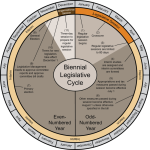Legislative Overview ~ April 9, 2025

During today’s floor sessions in the North Dakota Legislature, several key bills were debated and advanced. The House passed HB1408, a bill amending the state code to allow for annually reconvened legislative sessions, which could impact how often lawmakers address pressing issues. Additionally, HB1582, proposing a legislative study on state laws regarding false accusations or reports of crimes, was also discussed. The Senate addressed SB2289, which focuses on the disclosure of domestic violence protection orders to law enforcement, aiming to enhance public safety measures.
In other developments, the House advanced legislation related to education and public safety including HB1363, concerning cardiac emergency response plans for schools and athletic events. Meanwhile, the legislature continued deliberations on distressed ambulance services (SB2033) and charter school funding (SB2241), reflecting ongoing priorities in healthcare and education reform. Check my comments below for another interesting deliberation occurring today.
Here is a summary of what took place during today’s floor sessions:
19 Bills Passed in the Senate and awaiting Governor’s Signature: HB1016, HB1162, HB1225, HB1226, HB1263, HB1303, HB1363, HB1404, HB1410, HB1468, HB1533, HB1556, HB1603, SB2017, SB2076, SB2143, SB2269, SB2334, & SB2351 + HCR3003, HCR3025, HCR3028. Those which were failed include: HB1416, & HB1596 +HCR3001 & HCR3010.
19 Bills Passed in the House and awaiting Governor’s Signature: HB1025, HB1095, HB1194, HB1197, HB1317, HB1354, HB1355, HB1374, HB1375, HB1470, HB1481, HB1511, HB1549, HB1562, HB1592, SB2011, SB2013, SB2023, & SB2385. There were none which failed.
The Bills we are tracking regarding the business world include:
SB2076: https://ndlegis.gov/assembly/69-2025/regular/documents/25-8085-02000.pdf
The bill seeks to amend the North Dakota Century Code to modify the rules around prior authorization for drugs under medical assistance programs. It outlines requirements for medications exempt from prior authorization, including specific drug classes, and sets conditions for prescriptions for individuals under 18. The bill also details consultation processes, rebate negotiations, and documentation requirements.
This bill could affect healthcare providers, drug manufacturers, Medicaid recipients, and state agencies administering these programs, potentially influencing costs, drug accessibility, and administrative requirements.
SB2269: https://ndlegis.gov/assembly/69-2025/regular/documents/25-1278-03000.pdf
This Bill proposes amendments to North Dakota’s recall election procedures for city governing body members. It outlines petition requirements, signature verification processes, and timelines for conducting recall elections. The bill may impact business owners who engage with local governments by potentially altering leadership dynamics and policy decisions that affect business regulations and operations. The proposed changes aim to provide clearer guidelines for initiating and managing recall efforts within municipalities. The amendments in this bill would impose additional requirements or procedural complexities that make it more difficult for citizens to petition for a recall election. The ability to recall elected officials is a form of redress and participatory governance, and any measures that add barriers could limit public engagement and government accountability. Conversely, if the amendments clarify and streamline the process, they might enhance accessibility and ensure fairness.
HB1592: https://ndlegis.gov/assembly/69-2025/regular/documents/25-1292-03000.pdf
This Bill proposes amendments to North Dakota’s lignite research and development policies. It revises the composition and responsibilities of the lignite research council, enhances collaboration with the industrial commission, and updates public record exemptions. The bill aims to promote lignite industry growth by supporting research, marketing, and job creation while ensuring environmental compliance. Affected stakeholders include coal mining companies, energy producers, and state agencies involved in lignite development.
~ Today’s legislative session in North Dakota included a thought-provoking and complex discussion on nuclear waste disposal, a topic that has evolved significantly with advancements in technology. The deliberations touched on whether the state should allow above-ground or below-ground storage, restrict waste to in-state materials, or accept out-of-state nuclear waste. This debate reflects the growing need to address nuclear waste management as a practical issue rather than one driven solely by fear, highlighting how far technology and public perception have progressed.
The federal government’s mandate for states to manage their own nuclear waste added another layer of complexity to the discussion. North Dakota has to grapple with this issue, as seen with Senate Bill 2159, which allows the State Energy Research Center to explore nuclear waste storage and treatment projects. While some see this as an opportunity for innovation and economic development, others, including farmers and environmental groups, remain deeply concerned about the risks. The debate underscores the ongoing challenge of balancing technological progress with public safety and environmental stewardship. SB2159 passed by a margin of 57-32. How do you feel about that? Share your thoughts below.
Jan Wangler, Executive Director 

